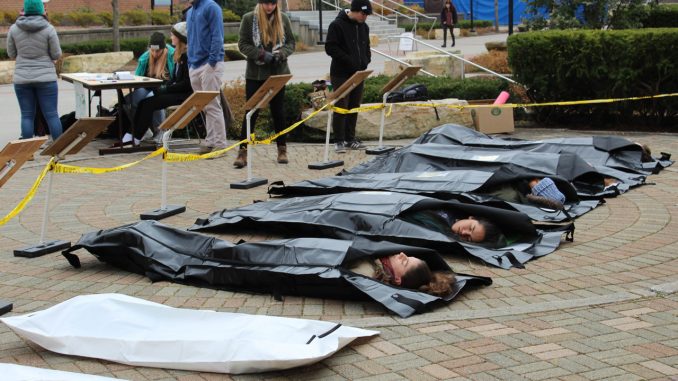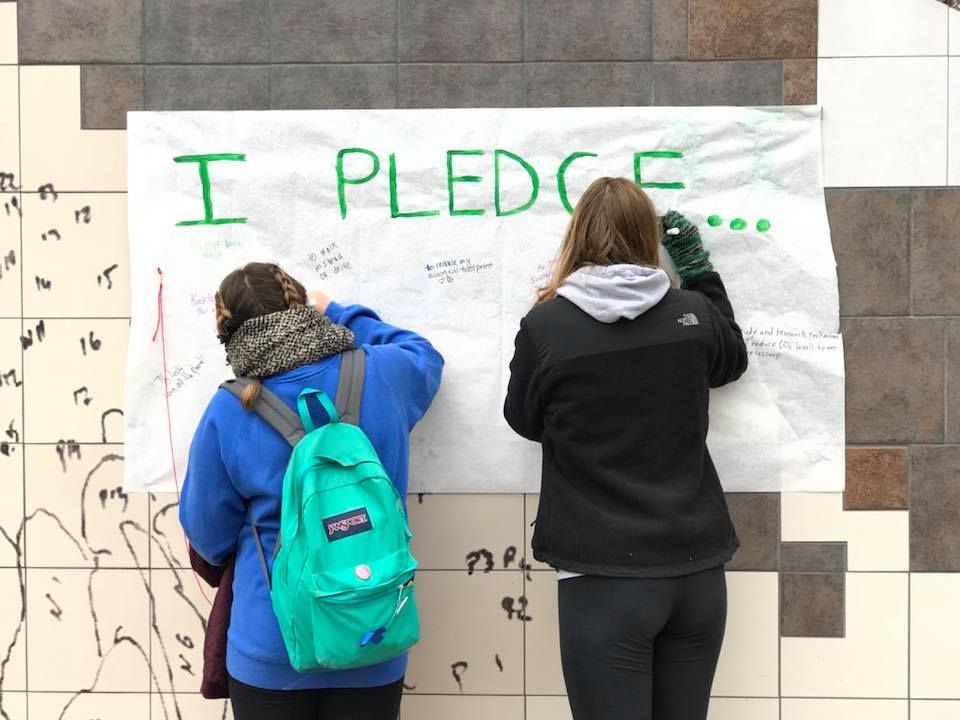
New Paltz’s Climate Action Club, which began this semester, demonstrated the effects of climate change near Humanities on Monday, Nov. 13 with the use of body bags.
Those who walked past Humanities from 12-2 p.m. were met with a strange sight: what appeared to be dead bodies stuffed in large black bags.
On Monday, Nov. 13 a new club on campus, the Climate Action Club, held a demonstration about the tragic effects of climate change on the Excelsior Concourse. Five members of the club lied still in adult-sized body bags next to two vacant child-sized ones, all sectioned off by yellow caution tape. A makeshift plaque accompanied each body bag, telling the story of how the person inside, represented by a living, breathing club member, died due to some disaster caused by climate change.
“We are trying to show the school as well as the community that people are dying from climate change today,” said club president Nicholas Leone. “Often times people look at climate change as a future issue, but it’s today.”
Some of the natural disasters represented at the event and attributed to climate change were Hurricane Maria and the wildfires in California.
Leone hesitated to use the word “natural” as a description for these events. According to him, while they do occur naturally, they are greatly intensified by the actions of humans.
According to Climate Signals, climate change amplifies the power of storms in several ways: higher sea levels cause waves to travel further inland, higher ocean surface temperatures give more energy to hurricanes and warmer air creates more rainfall.
The National Weather Service reported that Hurricane Harvey generated 60.58 inches of rainfall in Nederland, Texas earlier this year, setting a new record in the process.

A map depicting which areas of the world have been impacted by climate change the most was displayed in the background of the demonstration. Beneath it was the quote “Those who have contributed the least to climate change are being affected by it the most.”
A study from researchers in Sweden and British Columbia show that developed nations have the highest opportunity to reduce their carbon footprint because they possess the largest ones. Some given options are not driving or flying as often. In a report from The Guardian, professor of geosciences and international affairs at Princeton University Michael Oppenheimer said that one of many effects climate change has had on poor countries is fewer crop yields, which leads to higher prices for these countries.
Leone said that he saw some strong reactions from passersby who stopped to check things out.
“I’ve gotten a lot of wows,” he said. “A lot of thank yous, too. It seems like people are really taken back by it, which was the goal.”
Also featured was an “I pledge” banner, a blank poster with a marker attached where viewers could make a pledge to take actions against climate change in their lives. A few pledges were about eating less meat or walking more instead of driving.
New Paltz student Shady Tadroos spoke about what seeing the demonstration made him feel.
“It’s tragic,” he said. “Climate change is affecting all these people but we don’t really care about it because it’s not really affecting us personally. We should change this somehow.”
